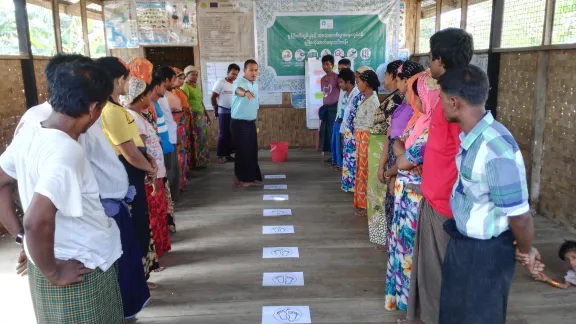
Potential entrepreneurs participate in an exercise about business risks during a training on entrepreneurship development, held at Thae Chaung IDP camp in Sittwe township, Myanmar. Photo: LWF/ Maung Nyien Naing
Opportunity to interact with IDP camp residents, and discuss cooperation with member churches
LWI) - The Lutheran World Federation (LWF) country program in Myanmar will host a delegation of the Committee for World Service, 12-17 January. The LWF has been carrying out humanitarian and development work in the country for more than 10 years.
The committee’s itinerary includes interaction with the country program staff, including those who manage internally displaced people’s camps (IDP), village development committees, educational facilities, and women development groups.
Present in Myanmar since 2008, the LWF country program anchors its activities in a rights-based approach that empowers those affected by internal conflict, natural disasters, and social and economic inequalities to manage their own lives. In 2019 this support reached over 100,000 people in Rakhine State and involved collaboration with 220 organizations based in the host communities and IDP camps.
During the visit to Myanmar, the delegation will also participate in a worship service jointly hosted by the four LWF member churches in the country, and discuss how to strengthen ongoing cooperation in diaconal work.
The committee has oversight for the strategic plan for World Service globally, and the 25 country programs in Africa, Asia, Central America and the Middle East. It gathers twice a year, once in a full session and once through an exposure visit to an LWF country program.
Bishop Henrik Stubkjaer (Evangelical Lutheran Church in Denmark) chairs the 16-person committee, made up of LWF Council members and advisers, and representatives of agencies or specialized development arms from the seven LWF regions.


